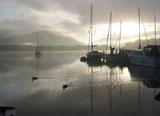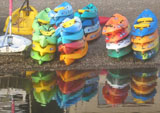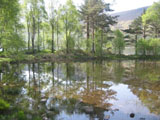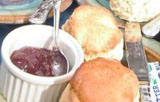|
|
Lake District
Valley and Low-level Walks
Derwentwater walks
Walla Crag - 4.5 miles
This walk offers splendid high-level views over Derwentwater and by
contrast falls to the lake shore by way of a forest trail. There is a
climb at the beginning, but the path is not rough. Given reasonable
footwear - that is with a good tread on the soles - anyone can manage the
walk with ease.Borrowdale walks
The walk starts at Ashness Gate, at the foot of the road to Watendlath.
Drive up the Borrowdale road for just over two miles and the Watendlath
road leads off it to the left. Go a few yards up this road, and park on
the car park on the left. Continue to walk up the Watendlath road. You are
soon in sight of Ashness Bridge, the famous view point. If you have not
previously visited this, walk up to the bridge and just up the beck bank
beyond it to see the view over Derwentwater with the bridge in the
foreground. However our path begins just before the bridge.
There is an
old gateway and near it a path going up the fell side on the left. The
path climbs through bracken, and as you gain height there is a fine view
left. The path passes over grass and rock and bears left. There are views
over Derwentwater and over to Bassenthwaite Lake. The path steepens under
a bent ash tree and then the way is less distinct. The direction is
forward and left and the path can be picked up as it gains height less
steeply. Later it levels off and gains height gradually. There are some
even more splendid views. However nearer the summit of the fell a shoulder
of land obscures the immediate view over the lake.
Another track is joined, follow it left on a pleasant grassy track. The
track narrows and curves round a cove. (Cat Gill.) The path widens and
begins to leave the lake slightly and climb again. Cross a beck by
stepping stones, and on to an open fell through heather patches.
When a
wall is reached follow it up slightly and then go over a stile and along
the path beyond. The summit gives a bird's-eye view of Keswick. Skiddaw is
behind, and Blencathra on its right. Go to the cairn. There is an
extensive view in all directions. If it is clear Scafell Pike and Great
Gable can be seen well over to the left as you face the lake.
Pick up the path leading on from the cairn to the fence and follow the
fence down taking care on slippery rock. Go over the stile, at the corner,
and continue on to follow the wall. Start to descend and bear right
towards broad grassy track. Follow the wall ahead. After undulations the
broad path descends on steep grass which can be slippery. Join a hard
track and bear left. Go over a stile. and continue down. Cross the
footbridge and join the macadam road. A road joins from the right. (Rakefoot).
Continue on.
If you look over the wall on the left you will soon see a
little footbridge. This is reached through a gate on the left. Cross the
footbridge and turn right, under hazelnut trees. When the path forks
continue on the right hand one. Cross the stile. Cross another stile and
at this point turn sharp left and head for the wood. Go over the stile
into it and forward through the bracken.
Go down a narrow path between larch trees. The path widens and there is an
iron ladder stile. Go over this or through the gate. Larches are soon
broken by hazels and pines, and you are on a forest trail in Great Wood.
This is a National Trust property. Eventually the path comes to a
cross-roads. Go straight across. The path is poor at first but gets better
further on. Go over a stile then left.
You are on a green track which
comes to the Borrowdale road at an old gateway. Cross the road and go
through the kissing-gate opposite. Turn left. Over in the lake there is
the smaller island called Rampsholme; and beyond it the larger one of St.
Herbert's island.
As you continue along the lake shore you reach a point
where crags, steepen. Here there. are several paths and you should take
your choice. If the lake is low it might be as well to walk by the lake
edge. Take your time if you go by the crag and pick your route carefully.
Watch for tree roots. You then reach a landing-stage. Leave the path here
for the road. Cross it again with care, and you are again at Ashness Gate
with the car park a little way up the Watendlath Road.
Lodore Fails and Ashness - 3 miles
Those who appreciate the Lake District landscape should not miss seeing
the great classics. The view over Derwentwater with Ashness Bridge in the
foreground is one of them. It is one of the most photographed views in
Britain.
A second classic is "Surprise View"; the airy look over Derwentwater that
hits the traveller when northbound from Watendlath. It is dramatic in the
extreme. The cliff below one's feet is so steep that one has the sensation
of flight; and through the gap in the ring of fell walls, is a view way
over to Bassenthwaite Lake.
Of all the Lake District waterfalls, the falls of Lodore are the most
famed. To combine all the above attractions into one walk, is superb. A round walk is easily achieved on good
paths. The day must be clear otherwise the views are lost and they're the
reason for the walk. Ideally it should be a clear day after heavy rain so
that the falls can be seen at their dramatic best, but this might be too
much to hope for. In any case the walk is worth doing. It is mainly
through mixed woodland.
The walk starts at the public car park at Kettlewell Common. Take the
Borrowdale road from Keswick. After two and a half miles there is a road
junction left, then the road approaches close to the lakeshore. Watch
then for the car park on the right in a partly-wooded promontory.
Having parked, leave the car park by the entrance and turn left along
the road. After only forty yards there is a gap in the wall on the right
by a National Trust footpath sign. Go
through this gap and join the path, right, through the woods. Shortly after
joining it the path bears left by a beck, then crosses a little footbridge
over it. Go forward across a little beck. A waterfall may be heard on the
left. This is a small and attractive steep fall but the approach to it is
uninviting and slippery. Continue on through the wood. The path rises and
goes by an old broken moss-covered wall before going closer to the road.
On approaching a wall boundary of the Lodore Hotel land, the path goes
inwards again, follows the wall for a distance, then heads for Lodore
Falls which should be heard thundering away ahead.
On reaching the falls turn right towards the hotel to reach the best
viewpoint for the lower part of them. There are other good viewpoints from
the beck sides higher, but if you seek them out take very great care over
wet rock.
Return to the footpath where you left it and go upwards with the beck on
your right. Very shortly you will see a zig-zag start off to the left.
Take this. The 'zig' ends at a rock face, then there is a 'zag' right.
When this path reaches a fallen oak tree, look right for a pleasant view
over Derwentwater with Skiddaw in the background. The path reaches the
upper part of the falls, and. there is a natural platform where you can
view them. The woodland below was mainly broadleaf trees, but as you climb
higher there are some European larch. The crags to the left above you are
very awesome, but attractively clothed in green moss, and ferns, and
foxgloves, and wood sage, and honeysuckle, and ivy, and bilberry, and
heather. The path reaches some rock steps which some people may find a
little awkward.
The path climbs steadily and easily all the way. Ignore the lesser paths
which branch off it to the right towards the beck. Eventually you will
reach a gap in a broken wall. Continue on along more level ground through
the wood. The path curves left. A Y-junction is eventually reached. The
path on the left apparently goes towards the edge of a crag. The right one
is to be taken. This is better defined and rises slightly, with the beck
still running to its right. Another junction is reached. Turn left along
the path which is built up; it runs at a sharp angle and there is a small
holly tree at its foot. It presently bends sharply right, eventually
running less distinctly through bracken, but immediately afterwards
joining a hard very well defined footpath. Turn left, and keep on this
hard path. It bears right to join a macadam road. Turn left to follow this
road, on a course parallel to it.
Soon this road makes a closer approach to the crags on the left. You are
approaching "Surprise View". There is a surfaced clearing on the right,
and just after this the view is a few steps to the left. Do not venture
too near the edge! The view is magnificent. Derwentwater, with Keswick at
the foot of Skiddaw to the right. Bassenthwaite is on to the left.
Directly opposite is the fell of Catbells, and to the left of that is
Maiden Moor. It may be possible to see the top of Great Gable in the
distance to the left. Grisedale Pike is behind and to the right of
Catbells. The Grasmoor range is behind to the left. Where the river
Derwent flows into the lake you can see large gravel beds. For some time after the last ice age, which made the
lakes, Derwentwater and
Bassenthwaite Lake must have been one large single lake.
Follow the road down and forward again, joining it to go through a
gateway. The road crosses; a bridge and a cattle grid. When you then pass
through another gateway, a barn will be seen on the right, and just below
this is Ashness Bridge. For the best viewpoint over Derwentwater, cross
the bridge then turn right up the beck side before looking back.
The way down is by public roads and is not too pleasant if there is
traffic in abundance, particularly on the main Borrowdale road at the
bottom. All, or nearly all, of this can be happily avoided on permissive
footpaths. Turn back up the road the way you have come. Pass the barn
again and the gateway, and a clearing is seen on the right. Walk into
this and on the right again is a stile over a fence. Cross the stile, and
follow the footpath downwards through the plantation. This reaches another
stile at the foot, by the beck side. Cross this stile, then bear left on
the footpath away from the beck. There is a portion of the path which is
not too clear, but as you descend it is more easily seen, as it crosses
under holly trees. Just after the hollies ignore the path to the right,
but descend left. The path zig-zags under more holly trees. Do not worry
if the paths are indistinct. The object is to lose height without
wandering over the fence-line which comes down on the right.
Soon the roadside wall is approached, and a path should be seen running parallel
to the road, turn left along it. This soon ends up at a narrow gateway.
Go through it with care onto the road, cross the road, and follow it on to the
left and you are soon back at the car park where you started.
Manesty Shore 3 miles
This is a good walk for strollers, loafers, and folk who like to throw
stones in water. There are some very fine views. Its disadvantage is that
the return journey follows the same route, but then one can see the scene
both ways. Its advantage is that the walk is almost completely level.
Park in Kettlewell car park (see above). Leave the car park and walk
carefully left for a short distance until you see a gap in the wall on
your right. Go through this and join the path to the right. Go on through
the trees and cross a footbridge. Follow the path on through this mossy
wood until the way is close to the road. A wall is then reached, the wall
of the grounds belonging to the Lodore Hotel. Turn right here and join the
main road again through a gate. Go carefully left along the road until the
pavement is reached on the other side of the road. Walk along here until
you come to a stile just after a gate. There should be a sign "Footpath to
Manesty." Go onto this path and across a bridge and along the green path
beyond. This leads onto wooden plank-walks over the wet ground. Go left
round some oak trees to join another plankwalk. Left from here is a good
view up the tree-cloaked jaws of Borrowdale.
You then reach the end of Great Bay on Derwentwater, with fine views over
the lake. Follow the bay round until you come to a pine-crowned
promontory. There is a splendid view from here. The woods are very fine,
and are cared for by the National Trust. There are pines and larch and
oak, and a population of red squirrels. You may not see these shy
creatures but you may find fir cones that have been chewed down to the
core, for the animals eat the seeds. All the shore here is public access
land and you may stay as long as you care to.
On the return journey the crag facing you is Shepherd's Crag which is very
popular with climbers. The most prominent limb is the one on the left.
Here is Brown Slabs where the novices learn the sport, and with a pair of
binoculars you can have an entertaining time watching them. Continue the
walk back by the outward route.
|
 |



